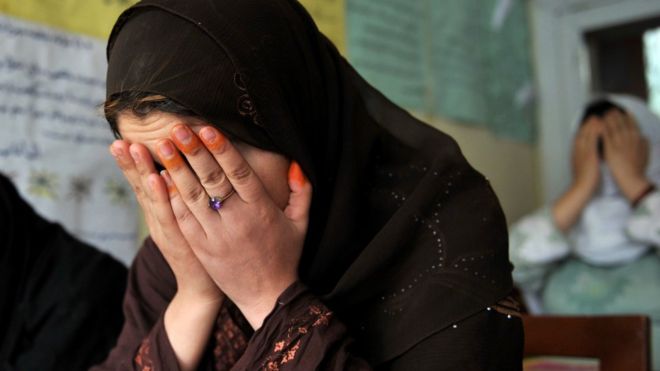Conservative and deeply tribal, Afghanistan is a country where violence against women are being committed on daily basis.
“When I look back at my childhood, all I remember is a bunch of bitter memories I had as a kid. A kid, who never enjoyed her girlhood,” says the 25 year old Sima.
Being the fourth daughter of her family, Sima, under social pressures, was forced to act and behave more like a boy. “I was dressed up as a boy and was expected to develop friendship with boys.”
Though never allowed to play with girls during her childhood, Ms. Sima now enjoys the company of female friends. “Pretending to be a boy left many impacts on my mind and body,” she remembers.
Sima’s family, traditional and conservative, dressed her as a boy, auspicious to believe that dressing Sima like a boy will bring a baby boy for the family. Seeing Sima dressed up in boy style, the entire village members, mainly men, would treat her as though she was a boy, a treatment that pushed Sima to experience terrifying crisis of identity in her early childhood.
Afghan family, a bigoted institution prefer boys, ignore girls
Sima’s childhood experience is a true example which depicts how bigoted, sexist and patriarchic Afghan families are. Seeing sons as future manpower that can make more benefits as compared to daughters, majority of rural Afghan families still prefer to have more sons and less daughters.
In our family, Sima says, we, the girls, were never seen as equal to boys. My boy cousins were treated differently, each of them had their own cups, but we were compelled to share even cups.
Sima and her sisters, never knew why their family was discriminating against them. It was a social norm commonly practiced by society, she says.
Violence against women is on rise
Conservative and deeply tribal, Afghanistan is a country where violence against women are being committed on daily basis. Tens of thousands of underage Afghan girls are forced to marry men who are often older than them. Forced marriage, honor killing, domestic violence are a common social phenomenon which is part of daily life in Afghanistan. Many rural Afghan families treat female members as entities used to serve the ‘dignity and honor’ of families.
A report, published by Afghanistan Independent Human Rights Commission (AIHRC) on 24 November, says Afghan women are not safe even in their homes. 97 percent of 2,762 cases of violence against women, registered in the commission, have been committed by family members. The rest three percent occurred in public spaces including working place, schools, universities, and in detention centers.
“Unlike my brothers, we, I and my sisters, were always expected to behave ‘properly’ so as to protect family’s honor. Worst of all, I had turned a blind eye on harassment for seven years,” says the 27 year old Ciyamoy with a deeply shivering voice and heartbreakingly painful eyes.
“My father promised my uncle to wed me off to his son when we were children. I was barely fifteen, knew nothing about marriage, but said yes to my cousin and we got engaged. I did not know the consequence of that ‘yes’. I was harassed, discriminated, and humiliated for seven consistent years, just to serve my family’s honor and social status, I had to tolerate and stay quiet,” she recalls.
Ciyamoy was lucky as her family, though after seven years, supported her break up her troubled relationship. But there are hundreds of Afghan women who are bond to bear sufferings, harassment and domestic violence.
According to AIHRC, violence against women has increased by eight percent over the past seven months. In particular, within seven months the level of violence against women has increased by 8.2 percent.
Public sphere is the second unsafe space for women, who mostly experience sexual and verbal violence. In the past seven months, 123 cases of sexual violence have been registered in the AIHRC.
“I was a high school student, when I experienced sexual harassment, for the first time, in public sphere. One day, on my way to school, a sloppy guy chased me. He touched my body. I could neither scream nor run after him. All I could do was to walk fast until I arrived in my school and broke into tears,” Sima recalls.
“One day, on my way to school, a sloppy guy chased me. He touched my body. I could neither scream nor to run after him. All I could do was to walk fast until I reached to my school and broke into crying.”
Culture of impunity
Many women rights activists say culture of impunity coupled with corruption are majors factor behind the growing street harassment in the country. They believe most women, who experience harassment, keep silent for they think corrupt law enforcement agencies and judicial institutions will not bring the culprits to justice.
However, other activists believe that an awareness campaign is the only way to fight against this ominous social problem, if not in the entire country yet in urban areas.
Out of 2,762 cases of violence, 420 were reported to the police, 530 were registered prosecutor offices, 793 were taken to the courts and 164 were settled by legal interventions. As many as 49 women were taken to safe houses and 50 victims were taken to mental health centers. 227 complaint cases were registered with the Ministry of Women Affairs and the Ministry of Justice.
Even with efforts being put by rights agencies and international rights organizations to fight domestic violence and street harassment in the country, Afghan women remain vulnerable and defenseless against domestic violence and harassment, let alone the Afghan children. Many activists believe a cultural revolution is required to take place to change the mindset and custom harassing the nation, though in reality, violence against women is a less-debated issue in the country’s media and academies.




